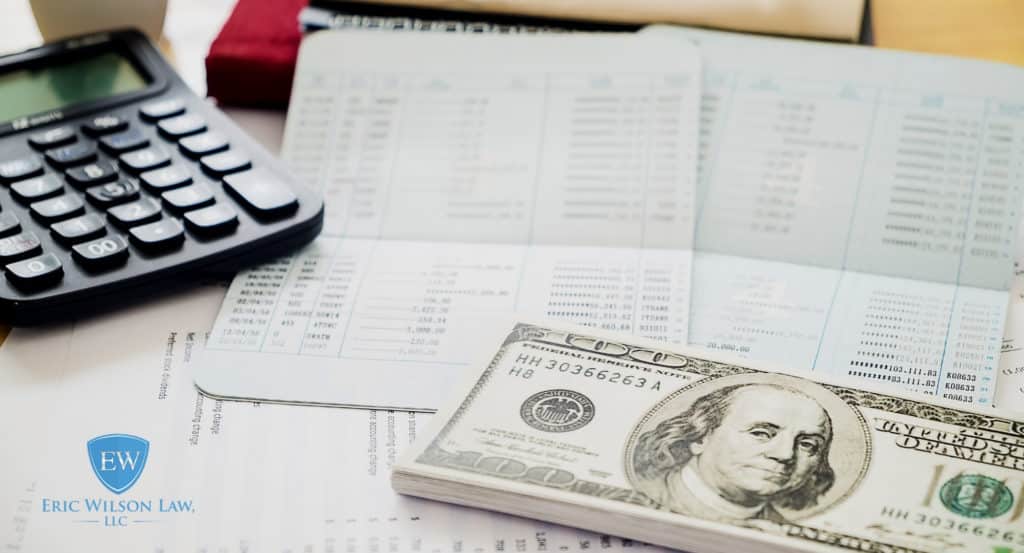Maybe you’ve heard of wage garnishment, where pesky creditors take money directly out of your paychecks. But can creditors garnish your bank account? The answer is yes. While taking money directly out of your bank account in order to pay off your debt seems incredibly unfair, it’s completely legal. The good news is that there are ways to protect yourself and your money from a bank account levy.
Eric Wilson Law LLC is a debt relief agency. Our legal team is passionate about advocating for the rights of debtors while providing them a path to financial freedom. Call an experienced bankruptcy attorney today at 205-349-1280.
What is Wage Garnishment?
Wage garnishment occurs when creditors take money directly out of your paycheck in order to pay off your debt. In order for debt collectors to take money from you, they must sue you and receive a money judgment from the bankruptcy court first.
What is a Bank Account Levy?
A bank levy is very similar to wage garnishment in that creditors can take money directly out of your bank account in order to pay off outstanding debts. Some creditors can garnish bank accounts without the debtor’s permission (such as the IRS), but many creditors have to receive court approval for a bank account levy.
Creditors who receive court judgments allowing them to garnish your bank account or wages are called judgment creditors. A judgment debtor, on the other hand, is a person who is ordered by a court to pay their debts.
Can a Savings Account Be Garnished?
Yes, a judgment creditor can basically take money from any bank account they choose in order to pay off your debt.
What Funds Are Exempt From Bank Account Levies?
Judgment creditors aren’t allowed to seize some types of funds, no matter what state you live in. The funds they’re not allowed to touch are called exempt funds. Exempt funds generally include federal benefits, such as:
- Social Security and Supplemental Security Income (SSI)
- FEMA aid
- Student loan aid
- Veteran’s benefits
- Civil service and federal retirement benefits
State law often exempts received child support payments and worker’s compensation from a bank levy. If you’re unsure about this exemption, ask your attorney about your specific state laws.
How Much Money Can Creditors Take Out of Bank Accounts?
Federal law allows creditors to take up to 25% of a debtor’s disposable income during wage garnishments. When it comes to bank account garnishments though, there is no limit.
What States Prohibit Bank Garnishment?
Bank garnishment is legal in all 50 states. However, four states prohibit wage garnishment for consumer debts. According to Debt.org, those states are Texas, South Carolina, Pennsylvania, and North Carolina.
How Bankruptcy Proceedings Can Stop Bank Account Garnishments
The best way to stop a debt collector from taking money from your bank accounts is to file bankruptcy. The bankruptcy court will issue an automatic stay immediately after your filing which will protect you from further creditor harassment, wage garnishment, bank garnishment, repossessions, etc.
It’s important to note that some debts are still subject to debt collection even when you file for Chapter 7 or Chapter 13 bankruptcy. For example, a judgment creditor can still garnish money for alimony and child support payments because these are considered high-priority debts.
How to Protect Your Bank Account From Creditors
If you’re struggling with debt, one of your main priorities is to protect bank accounts in your name. In order to protect your accounts and your money from most creditors, consider the tips below.
Don’t Ignore Garnishment Summons and Judgment Creditors
First thing is first: if you’re in debt, don’t ignore your creditors, and don’t ignore a garnishment order. Making a good faith effort to pay off your debt every month will likely prevent your creditors from seeking a garnishment summons. You can work with a credit counselor or a bankruptcy attorney to create a debt payment plan. But if your creditors do issue a garnishment summons, you need to act fast before your bank account becomes frozen.
Make Sure That Federal Benefits are Directly Deposited
If a bank receives a garnishment order, one of the first things they’re going to do is check your account to see if your direct deposits include federal benefits. Basically, the bank isn’t allowed to freeze the last two months of government assistance deposits. But the same rule doesn’t apply to federal benefits deposited via check. So in order to make everything easier on yourself and the system, make sure you receive all your government assistance via direct deposit.
Don’t Transfer Social Security Money to Different Bank Accounts
As previously stated, social security money is exempt from garnishment. But transferring this money to other accounts can make it difficult for you, the bank, and the creditors to determine if it comes from an exempt source. To avoid confusion and possibly getting your social security money taken away from you, make sure it’s directly deposited into one account and make sure it stays there.
Separate Exempt and Non-Exempt Money
If your bank account has both exempt and non exempt funds in it, the garnishment process can get confusing. This is because both creditors and banks will have to determine which funds are exempt and which ones aren’t through your bank statements. So if a judgment creditor seizes exempt funds, you can get them back, it just may take a month or more. In order to prevent this issue with bank levies, it’s best to keep your exempt and non-exempt money in different accounts.
Don’t Use a Bank That You Already Owe Money To
If you owe money to a bank that holds multiple bank accounts, they have a right to set off the money in your account and use it to pay off debt. Banks that hold your money don’t need a court order to do this. In order to best protect yourself and your money, keep your bank accounts in a bank that doesn’t lend you money.
What To Do When Your Bank Account is Garnished
You can certainly object to wage or bank garnishment orders. In order to do that, it’s best to seek legal representation from an attorney who has extensive knowledge of fair debt collection practices and individual state laws. Not only does the legal team at Eric Wilson Law have decades of experience in providing bankruptcy relief to their clients, but they also have experience in helping every single judgment debtor find relief from bank garnishment. Our team can help you figure out the best way to protect yourself and your money, whether that’s through a bankruptcy filing or a garnishment objection. We’ll walk you through the whole process until you receive the fresh start you deserve.
Call Eric Wilson Law Today
If you’re in debt, you may be wondering: can creditors garnish your bank account? While the answer is yes, you do have options to protect yourself and your money. The legal team at Eric Wilson Law LLC has extensive knowledge of both the bankruptcy code and the Fair Debt Collection Practices Act. We can stop your creditors from engaging in all collection efforts while you regain control of your finances. We can also help you fix your credit report, because that’s a huge part of financial recovery too. Call 205-349-1280 to get started on your attorney-client relationship today.



